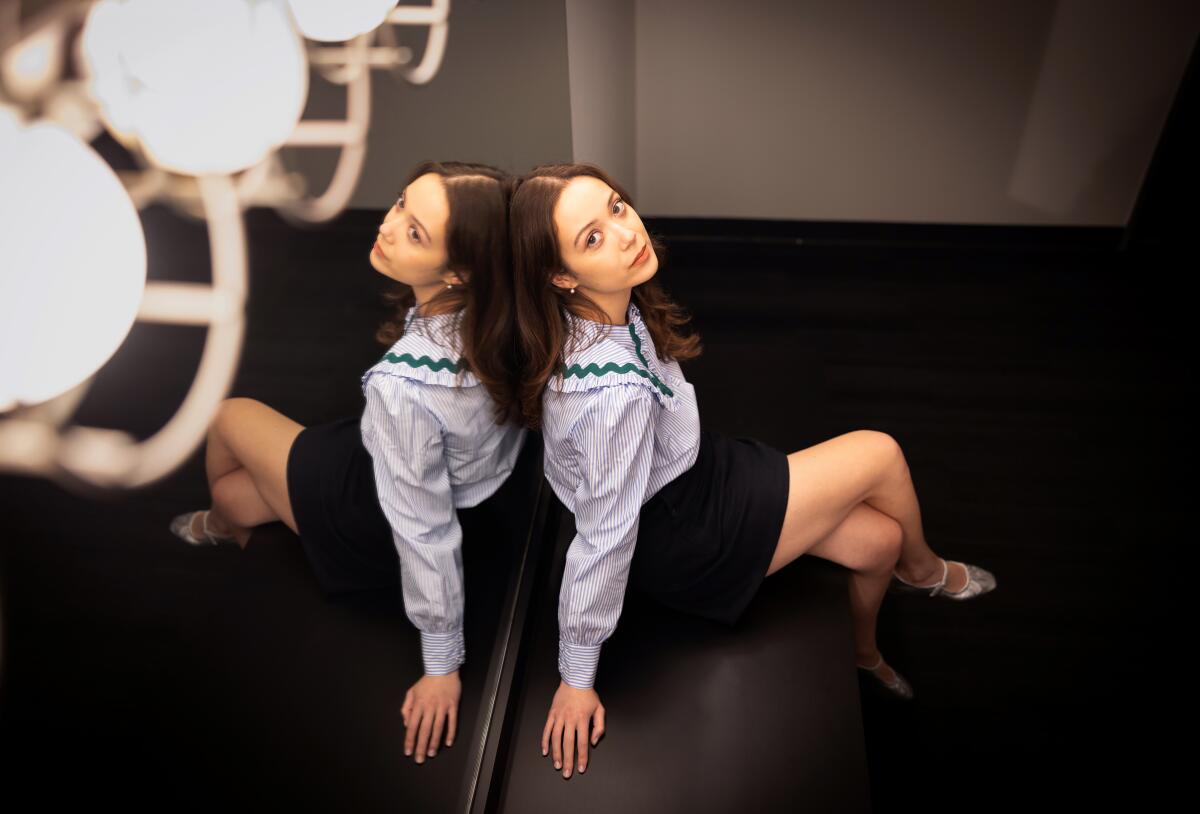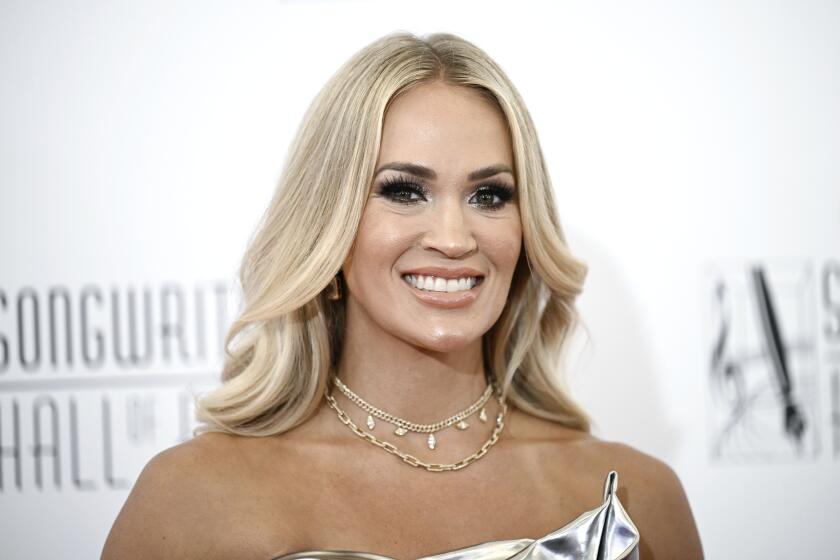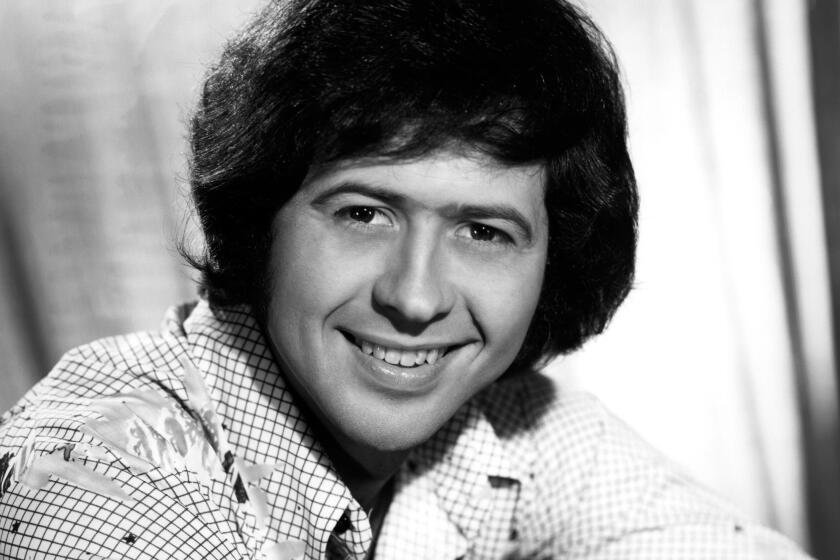Laufey on jazz purists, Olivia Rodrigo and her new Hollywood Bowl concert movie

- Share via
Five years ago, Laufey knew who she was.
“Or at least I knew the many different people I was,” she says. “What I didn’t know was who I was as one person.”
The daughter of an Icelandic father and a Chinese mother, Laufey grew up studying classical cello in Reykjavik. Then she went to Boston’s Berklee College of Music and learned to sing jazz standards. All the while, she says, “I loved musicals and I loved Taylor Swift. I always wanted to find a way to blend these worlds together, but I just didn’t have any example of an artist that had done it.”
So she did it herself: During the pandemic, Laufey started writing songs — swoony, old-fashioned love songs with tricky melodies and jazzy chord changes — and performing them on TikTok, where she quickly built an audience of retro-curious zoomers. Her debut album, 2022’s “Everything I Know About Love,” hit No. 3 on Billboard’s jazz albums tally; last year’s follow-up, “Bewitched,” topped that chart and won a Grammy for traditional pop vocal album.
“I think I’m the youngest winner ever in that category,” says the 25-year-old, “which is funny because I’m not that young.”
The 81-year-old songwriter and composer is the subject of a new biography by former Times pop music critic Robert Hilburn.
Now she’s the star of a splashy concert movie opening in theaters this weekend: “Laufey’s A Night at the Symphony: Hollywood Bowl.” Directed by Sam Wrench — known to Swifties for his job helming the blockbuster “Taylor Swift: The Eras Tour” — Laufey’s film documents a sold-out gig she played with the Los Angeles Philharmonic in August at the iconic hillside amphitheater. Between renditions of her own tunes and a handful of standards including “I Wish You Love” and “It Could Happen to You,” we see Laufey hang out with her twin sister (and creative director), Junia, and motor a vintage car around L.A., where she’s lived since 2021.
“It was really important to me that fans get a little bit of a look into my brain,” she says of the movie. Wearing a pinstriped shirt with an embroidered Peter Pan collar — “I dress like a kindergartener,” she says with a laugh — Laufey sat down at the Bowl on a recent afternoon for a wide-ranging chat in the same dressing room she used the night of her concert.
I wondered if you found it hard to stay in the moment during your show here because you knew it was being filmed for posterity.
The only time I’m ever fully present is on stage. I’m always thinking about the future — like, I know my schedule two years ahead of time. But once I’m on stage, cameras or no cameras, I just lock in. I knew the movie being filmed was important, but it wasn’t the priority for me that night. The priority was to perform for the 17,000 people in the audience.
That surprises me given how many of your fans came to you through a screen.
The performance is always the priority. If I really hated how I was [in the movie], I could have made it go away. But that night would never go away.
As a kid, did you imagine living in L.A.?
Absolutely. I grew up hearing Miley Cyrus sing about hopping off the plane at LAX and making her dreams come true. I still romanticize the idea of living here — looking up every day and seeing the Hollywood sign. It feels like I’m in a movie.

The cinematography in the concert film reminded me of “La La Land.” Was “La La Land” a big inspiration for you?
I don’t think it’s necessarily that I’m directly influenced by “La La Land” but that “La La Land” and I have the exact same sources of influence.
Do you identify more with the Ryan Gosling character or the Emma Stone character?
I think I’ve been both. There was a time in my life as a musician where I was more protective of my art — snobby, for lack of better word. And I’m very much Gosling in the way that I take inspiration from the old. However, the Emma Stone character — a girl living with roommates in West Hollywood, having this impossible dream — I’m her too.
I love that scene where she and her roommates are getting ready to go out.
I’ve lived that so many times. I didn’t move to L.A. once things started moving. I moved into a little sublease on Fairfax, and my parents were super-worried about me. So I feel like I’m the child of the two characters — their child that actually wasn’t alive at the end of the film because it was all a dream.
Do you think the movie is ever making fun of Gosling’s character?
One hundred percent. He’s a great reflection of a lot of guys I’ve dated.
In L.A.? In Iceland?
Everywhere. I went to Berklee College of Music — I’ve seen that person. And I’ve been that person. I’m no longer the puritan, but I understand where it comes from. It comes from a pure love of the art.
You’ve spoken about the interplay between technique and musicality. How does charisma or star power figure into your skill set?
It sounds so self-complimentary to even indulge in the thought of my having that. But yeah — I look at other musicians, and you can see who has that star quality.
Who has it?
I think Chappell Roan has it. I think Olivia Rodrigo has it.
The Grammy-winning producer and songwriter looks back at a very busy 2024, including his work with Taylor Swift, Sabrina Carpenter and his band Bleachers.
You accompanied Olivia to the premiere of her concert movie in October. How’d you two meet?
She just texted me out of nowhere from an unknown number: “Hey, it’s Olivia Rodrigo. I’m such a fan of your music. Can we hang out sometime?” I was like, “What?!” I literally texted my whole team because I thought maybe it was spam. That’s one way to get me: “Yeah, here’s my address.” Then we just hung out. We’re both half-Asian, half-white — we’ve always had this kind of mixed identity. And anything that I’ve gone through this year, she’s gone through on a very exaggerated level. It’s been really lovely to be able to check in and hang out and not feel crazy.
Do you feel like a part of the theater-kid moment happening in pop right now?
Are you kidding? My favorite composers are Irving Berlin, Gershwin, Cole Porter. My inspiration sources are all from musicals.
Have you seen “Wicked”?
I went to the premiere — it’s the best movie I’ve ever seen. I’ve felt like that twice watching a movie, maybe three times: “Wicked,” “La La Land” and “An American in Paris.”
One thing that defines theater-kid energy in my mind is using artifice to get to an emotional honesty.
The common denominator between music right now that’s popular, whether it’s indie music or pop music or rock music, is honesty and humor. My music is extremely different from Olivia’s or Chappell’s or Taylor’s, but we all have brutal honesty and self-deprecating humor. I think theater kids have always had self-deprecating humor because they’ve been forced to as a coping mechanism from being bullied.
There’s a version of your career where you don’t become a songwriter — where you just sing standards. Would that have been satisfying?
I mean, there’s a reason I didn’t do it.

Do you think your identity as a twin enriches your songwriting?
Definitely. I already have a soulmate — I’ve had a soulmate since the day I was born. So the pursuit of finding friends, love, people, companions in life, the bar is so much higher, which presents so many more challenges, which presents so many more opportunities to write great songs.
In terms of dating, are guys ever threatened by your relationship with your sister?
If they are, they haven’t made it very far [laughs]. I think it’s clear from the start that if you’re close with me, you’re close with her.
Does the beauty of your singing voice ever feel like a limitation? Can you use it to express something ugly?
It’s funny that you mention that right now, because I’m in the process of working on my next album, and I’m grappling with exactly this. All of my music, whether it’s sad or happy or sarcastic, it’s still woven in this very mellow kind of beautiful singing style, which is the way that my voice most naturally comes out. But I’ve been toying around with the different emotions that I can evoke with my voice on this next album.
I went to see Sabrina Carpenter play at Crypto.com Arena recently —
I was there — it was incredible.
The show was so bawdy — almost vulgar in a really fun way. Is there room for that in your music?
It’s definitely something I think about. I have songs about those themes and topics — they’re just hidden in code. I have a song called “Haunted,” which is about having a one-night stand. I’m becoming more and more honest with myself as I grow older, and I think it’s being reflected in my songwriting for sure.
Could you drop an F-bomb in a song?
The last song on the “Bewitched” [deluxe edition], one of the last words is “f—.” I think the question I’ve been asking myself is: How do I use these things that draw attention in a way that doesn’t feel like they’re just there to draw attention? I could so easily write the most vulgar song right now, and it would cause so much discourse because I have this very clean image in people’s eyes. The funny thing is, I’m the biggest potty mouth that anybody knows.
The singer and songwriter with the Olympic-athlete-level voice talks about her second career as the self-appointed Queen of Christmas.
I watched a very long YouTube video about you where a jazz guy —
I know which video you’re talking about.
He breaks down why you’re not a jazz musician, and one of his points is that you don’t improvise.
I actually do improvise more than people think — I improvise on cello, I improvise on piano. It’s just the vocal bits that I don’t improvise in concert as much. But it was always difficult for me, because coming from classical music, you’re very bound to what’s on the page. There’s no improvisation in classical music — it’s about learning the repertoire, not creating the repertoire.
What do you make of criticism like in that video?
If you want to hear conversations from these communities — jazz communities and classical communities — where they’re analyzing my music and ripping it apart, I’m like, “That sounds fun — enjoy it.” I respect those communities so much. I don’t know if they respect me as much in return.
Does that hurt your feelings?
I’m a people pleaser, so of course. But my music didn’t become popular because I’m a jazz musician or a classical musician. I love that music, and I know to my core that I understand it. But the whole reason I have a career is because I didn’t put myself in one of those boxes. People are like, “But it’s not jazz!” And I’m like, “Yeah, it’s not.” I never claimed that it was.
Some people seem to want you to claim it.
Because they want to shout at me. They want to see me stand there and look dumb like I know nothing about the music and that I’m just taking the good bits of it and making it popular. And that just couldn’t be further from the truth.
Is that a gender thing?
Everything’s a bit of a gender thing. People who care deeply about their genre and want it preserved, they see me coming and they go to the concert and they see all these young women with ribbons in their hair — maybe it feels like an attack.
Do you know Rufus Wainwright’s music?
Sort of. He handed me my Grammy.
He was doing something somewhat similar to you 25 years ago: using beautiful old forms to create new songs about modern lives. But I’m not sure he faced the same degree of skepticism.
I don’t think the classical and jazz communities have always been the safest place for a woman — I’ll just leave it at that.
Last thing: You’ve had a fruitful creative partnership with your producer Spencer Stewart. But for the next record I can envision someone urging you to work with, say, Jack Antonoff or Dan Nigro.
I’m working with Spencer on this album.
Was that important to you?
He just really gets me, and he’s the most versatile producer I know. If I came to him and I was like, “I want to do a pop record,” he could do that too. But I think any executive or any manager that would suggest I turn my career on its head would not be a very good executive. There are so many incredible pop musicians right now — women who are all my age and write about mature, interesting, smart, clever, beautiful themes — that there’s no reason for me to do that. I feel a responsibility to speak to listeners on the side of their brain that listens to my kind of music.
More to Read
The biggest entertainment stories
Get our big stories about Hollywood, film, television, music, arts, culture and more right in your inbox as soon as they publish.
You may occasionally receive promotional content from the Los Angeles Times.














